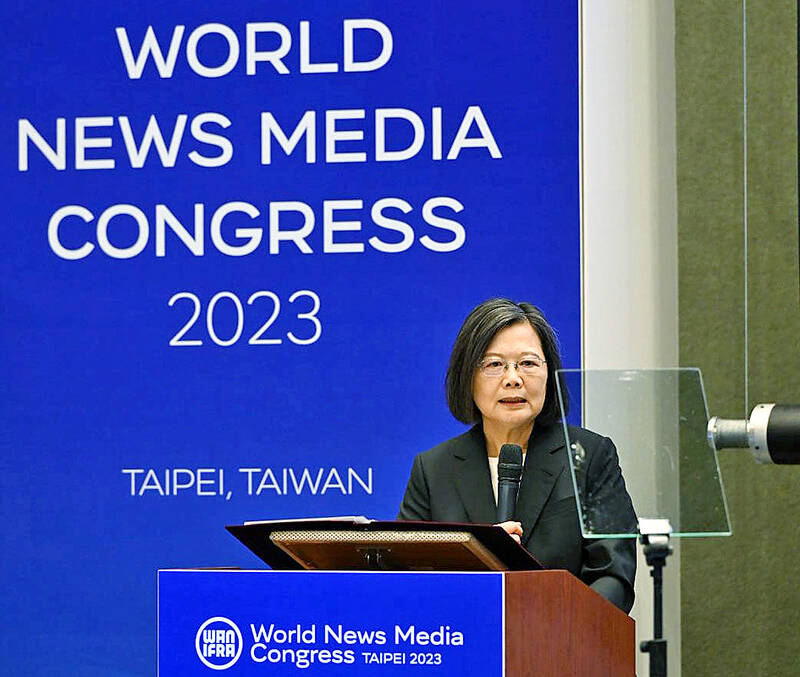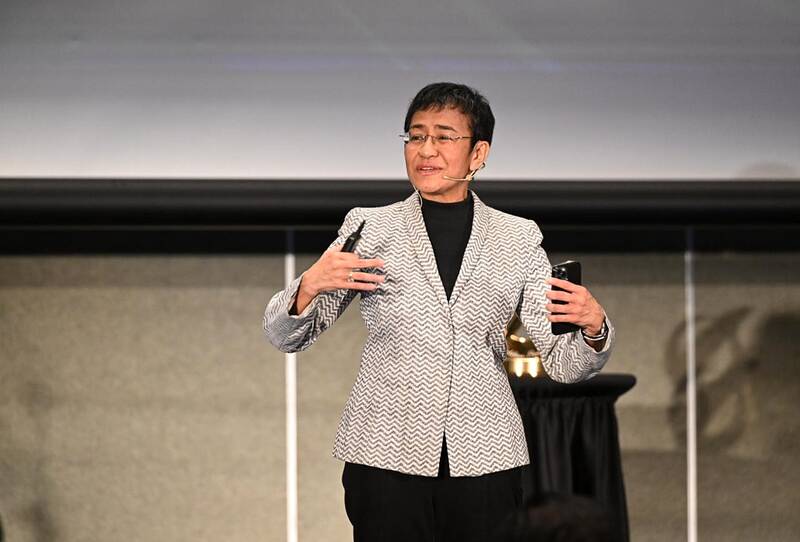Combatting disinformation is a shared challenge all democracies must face, President Tsai Ing-wen (蔡英文) said yesterday in a speech at the opening ceremony of the World News Media Congress in Taipei
“Media freedom and information integrity affect us all, and, disinformation directly influences our way of life,” Tsai said.
“Coming together to discuss the most pressing issues facing the industry and democracy is what we should be doing now,” she added.

Photo: Chang Chia-ming, Taipei Times
Taiwan in the past few years has become home to many international media professionals, Tsai said.
“This is testament to Taiwan’s hard work on safeguarding media freedom and the right to free speech,” she said. “It also shows the world how deeply Taiwan values this important pillar of democracy.”
“Taiwan’s vibrant civil society and civic tech community have contributed immensely to combating disinformation,” she said.

Photo: Chang ChIA-Ming, Taipei Times
However, it is not the only way that Taiwan contributes in the region and the world, she added.
“The maintenance of regional security has been a significant part of Taiwan’s overall government policy,” she said.
“We are fully committed to collaborating with our neighbors and democratic partners to prevent armed conflict in the Taiwan Strait, as well as in the East and South China seas,” she added.
Fernando de Yarza, president of the World Association of News Publishers, the event’s main organizer, told the ceremony that holding the World News Media Congress in Taiwan was a show of support for the nation.
“To be in Taiwan in 2023 is a statement supporting democracy and free press at the time of heightened international tension,” said De Yarza, who heads Madrid-based communications and technology group Henneo.
“The world press shows its support by coming to Taiwan,” he said.
“We of course are right here at the moment of great importance for Taiwan, the region and indeed the world,” he said, adding that tensions across the Taiwan Strait have put “all those who care for [the] democratic way of life very much on a high alert.”
“The right of the Taiwanese people to choose their destiny, determine their future [and] live in peace is something those of us visiting from afar can recognize as being vital to maintain,” he added.
The three-day event, which is being held for the first time in Taiwan, brings together more than 900 leaders in journalism and news media organizations from 58 countries to discuss common challenges and share ideas.
The event, held in Asia for the first time since Thailand hosted it in 2013, opened with media leaders expressing concern over the implications of artificial intelligence and other advanced technologies on the flow of information across the world.
While AI tools such as ChatGPT could be game- changing in the newsroom, they could also be "potentially catastrophic," de Yarza said, adding people in the media circle must not "repeat the mistakes of the past -- a rush to embrace new technology without considering the implications."
Philippines-born Nobel Peace Prize laureate Maria Angelita Ressa, meanwhile, said in her speech at the opening that AI was one of the least regulated industries globally despite warnings from tech leaders of the potential risks of not having control over the technology.
This technology could be "weaponized" and used against democratic societies by mining private data or spreading false information, she said, adding "the corruption of our information system leads to the corruption of our democracy."
It is "not a freedom-of-speech issue, but a safety issue," said Ressa, co-founder of Filipino online news media Rappler, warning that inaction by democratic countries would lead to significant harms.
Additional Reporting by CNA

A Ministry of Foreign Affairs official yesterday said that a delegation that visited China for an APEC meeting did not receive any kind of treatment that downgraded Taiwan’s sovereignty. Department of International Organizations Director-General Jonathan Sun (孫儉元) said that he and a group of ministry officials visited Shenzhen, China, to attend the APEC Informal Senior Officials’ Meeting last month. The trip went “smoothly and safely” for all Taiwanese delegates, as the Chinese side arranged the trip in accordance with long-standing practices, Sun said at the ministry’s weekly briefing. The Taiwanese group did not encounter any political suppression, he said. Sun made the remarks when

The Taiwanese passport ranked 33rd in a global listing of passports by convenience this month, rising three places from last month’s ranking, but matching its position in January last year. The Henley Passport Index, an international ranking of passports by the number of designations its holder can travel to without a visa, showed that the Taiwan passport enables holders to travel to 139 countries and territories without a visa. Singapore’s passport was ranked the most powerful with visa-free access to 192 destinations out of 227, according to the index published on Tuesday by UK-based migration investment consultancy firm Henley and Partners. Japan’s and

BROAD AGREEMENT: The two are nearing a trade deal to reduce Taiwan’s tariff to 15% and a commitment for TSMC to build five more fabs, a ‘New York Times’ report said Taiwan and the US have reached a broad consensus on a trade deal, the Executive Yuan’s Office of Trade Negotiations said yesterday, after a report said that Washington is set to reduce Taiwan’s tariff rate to 15 percent. The New York Times on Monday reported that the two nations are nearing a trade deal to reduce Taiwan’s tariff rate to 15 percent and commit Taiwan Semiconductor Manufacturing Co (TSMC, 台積電) to building at least five more facilities in the US. “The agreement, which has been under negotiation for months, is being legally scrubbed and could be announced this month,” the paper said,

MIXED SOURCING: While Taiwan is expanding domestic production, it also sources munitions overseas, as some, like M855 rounds, are cheaper than locally made ones Taiwan and the US plan to jointly produce 155mm artillery shells, as the munition is in high demand due to the Ukraine-Russia war and should be useful in Taiwan’s self-defense, Armaments Bureau Director-General Lieutenant General Lin Wen-hsiang (林文祥) told lawmakers in Taipei yesterday. Lin was responding to questions about Taiwan’s partnership with allies in producing munitions at a meeting of the legislature’s Foreign Affairs and National Defense Committee. Given the intense demand for 155mm artillery shells in Ukraine’s defense against the Russian invasion, and in light of Taiwan’s own defensive needs, Taipei and Washington plan to jointly produce 155mm shells, said Lin,